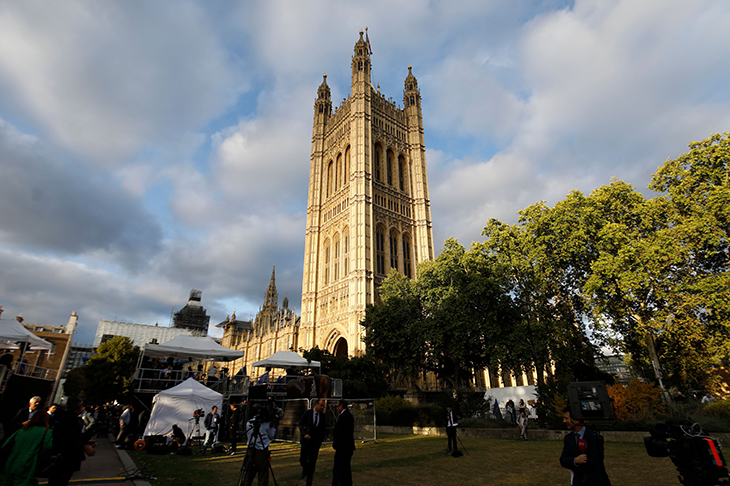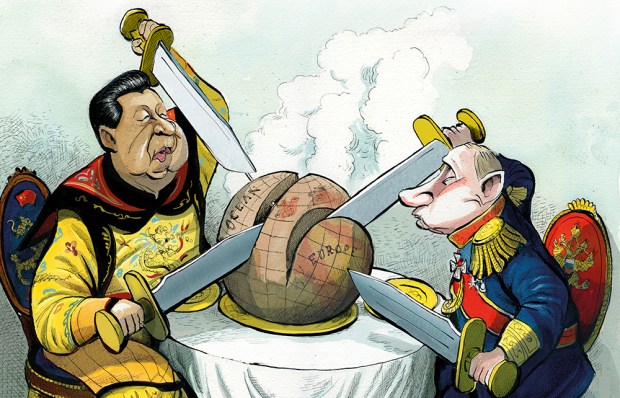Leaving an evening meeting in Westminster on Monday night, I walked to Charing Cross. Approaching the public path which runs across College Green by Parliament, I found, as so often nowadays, that it was fenced off to allow those pop-up studios which the big television channels erect to create their instant news circus. Fed up that the normal way was yet again blocked by what Psalm 84 calls ‘the tents of wickedness’, I lifted the barrier open and walked through. Two security guards leapt out of the nearest hut and tried to block me. I pressed on, however, and they could only scamper after me calling out ‘Health and safety! Health and safety!’ At the other end, the temporary barriers were locked, so I climbed over them (the barriers, not the security guards).
Moving on to Whitehall, I encountered, in the middle of the road, a vehicle and trailer. The latter carried a vast plasma screen showing a large picture of Jack Williment-Barr, the four-year-old boy who, in circumstances which remain obscure, had been photographed, in a picture published in the Daily Mirror, lying on the floor of a hospital in Leeds. The screen was placed to make it visible for and reproachful to the occupant of 10 Downing Street. I went up to the driver and asked him what he was doing there. He said he was being paid, but did not know who was ultimately paying him, or what the whole thing was for. I wonder why the rules forbid citizens from traversing an ordinary public path in order to let the media take over, yet allow the highway to be occupied by a large (and tasteless) political publicity stunt.
The answer, I think, is official deference to the mainstream media triumphalism which equates its own interests with those of the general population. These interests include a ready supply of protesters whom the big TV companies can film in convenient and famous locations, hence the TV tents. The following morning, on the BBC Today programme, Nick Robinson — who seems almost obsessively opposed to Boris Johnson, perhaps because of something or other in Oxford days (a failure to gain election to the Bullingdon Club?) — was riding the highest of horses. When an ITV journalist had shown the Prime Minister the photograph of young Jack on his phone, Nick complained, Boris had declined to comment and put the journalist’s phone in his pocket without looking at it. Psychoanalyst Dr Laura Kuenssberg later diagnosed this as an amazing ‘lack of empathy’. In a further act of lèse-majesté, which Nick reported in shocked tones, the Johnson entourage had somehow misled ‘some very high-profile journalists’ over an obscure related issue. Nick did not mention that, in the interview, Boris had expressed his sympathy with the boy’s case. Nor did he acknowledge that any Tory politician approached with the offer of a sight of a picture on a media phone while on camera in an election campaign would rightly have suspected a trap. Later, Ian Watson filed for the BBC a mawkish item online called ‘One sick boy and the NHS’, equating extreme protest with wider public opinion. On Tuesday’s lunchtime BBC News, efforts were made to imply that a Tory social media campaign had spread lies saying that the hospital picture had been staged. The BBC never offered a clear narrative about what had actually happened, or explained who had put Jack on the floor and why. It just wanted to keep going for as long as possible with the Jack picture.
This contrasted sharply with the BBC’s handling, also on Tuesday, of the leaked phone conversation between Jon Ashworth, the shadow health secretary, and a Tory friend of his about how normally Labour voters in the north and Midlands ‘can’t stand’ Jeremy Corbyn, and how he would be seen in government as a risk to national security. Here it concentrated not on what Mr Ashworth had said, but on how his friend had betrayed him — not a line the BBC, with its uncritical praise for ‘whistleblowers’, usually deploys. In its PM programme, Evan Davis turned the Ashworth revelation into part of a story about ‘the fight between honesty and mendacity’, introduced with a quotation from the fiercely anti-Boris Lord Patten of Barnes, the BBC’s ex-chairman.
On Wednesday, Chris ‘Reality Check’ Morris seemed to endorse Plaid Cymru’s idea that the ‘lies’ of politicians should be subjected to legal supervision. Behind all this is the conceit that BBC journalism should sit in judgment. This is truly wrong, and quite different from the justified search for accuracy in reporting.The BBC’s constant attacks on social media campaigns are not crusades for truth, but protests by a cartel. On big issues on which it feels strongly, such as Brexit (which it opposes) and climate change (whose wildest alarmists it swallows whole), it is just as biased, though not as cheapskate, as the dotty rubbish to be found online. It is captivated by the Robinson idea of ‘very high-profile journalists’, never wondering whether it is good for democracy that journalists should be more high-profile than elected politicians. And it is beside itself with rage that a once high-profile journalist, one Boris Johnson, jumped ship, got elected and became Prime Minister.
So it was a pity that Boris introduced the idea of getting rid of the BBC licence fee so late in the campaign. The fee, compulsory for all those who own a television and watch terrestrial programmes, is the last poll tax, and the biggest enemy of diversity in our entire media environment.
In a Diary in these pages on 20 July this year, the very high-profile Nick Robinson asked ‘What will the new Prime Minister be able to achieve that Mrs May hasn’t?’ The answer came quickly — a party uniting round Brexit and a deal agreed with the EU. By the time you read this, you will know whether the answer also includes winning a general election.
Got something to add? Join the discussion and comment below.
Get 10 issues for just $10
Subscribe to The Spectator Australia today for the next 10 magazine issues, plus full online access, for just $10.
You might disagree with half of it, but you’ll enjoy reading all of it. Try your first month for free, then just $2 a week for the remainder of your first year.















Comments
Don't miss out
Join the conversation with other Spectator Australia readers. Subscribe to leave a comment.
SUBSCRIBEAlready a subscriber? Log in